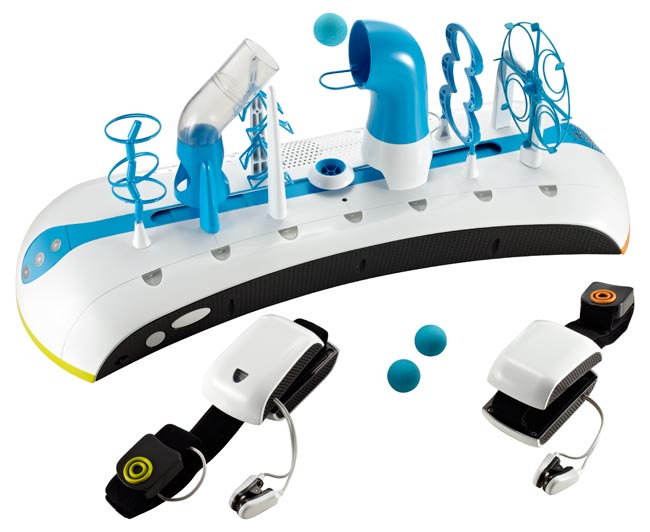Use Tech to Manage Your 12,000 Daily Thoughts
 According to a widely quoted National Science Foundation Study, on average we have 12,000 thoughts per day. And it can run as many as 60,000 thoughts per day. I have been unable to locate the original study. No matter, we have all experienced the constant self talk and flow of ideas that make up everyday experience.
According to a widely quoted National Science Foundation Study, on average we have 12,000 thoughts per day. And it can run as many as 60,000 thoughts per day. I have been unable to locate the original study. No matter, we have all experienced the constant self talk and flow of ideas that make up everyday experience.
How do we mange so many ideas? Are there ways to manage our idea flow that will improve cognitive performance in decision making, self-regulation and creative problem solving?
Well known techniques for managing daily idea flow include journaling, keeping a notepad by your bed and other methods of trying to write them down. There is value in that but it is very low tech. Powerful but simple tools like Evernote, give us a way of quickly capturing our idea flow electronically (phone or computer) and relating it to other on-line documents and information.
The very act of documenting our idea flow slows it down and changes it. We may lose important notions. Fortunately, voice recognition technology has advanced to the point where we can reliably capture our thought by speaking to our phone or computer. Check out the Dragon line of naturally speaking products from Nuance. They have dictation and voice recognition products for every need including the iPhone dictation app shown below.
But will using technology to smoothly capture our thought flows improve our cognitive performance?
There is some evidence it does. For example, in the June 2011 issue of Wired, Clive Thompson argues in his story, Hold That Thought, that voice recognition technology may help us be more creative and over come mental challenges such as writer’s block.
From a general standpoint, having a transcript of all our thoughts in a given day could provide many insights. For example, we could identify patterns of self-talk that are negative or see bits of important ideas that might otherwise have been lost.
This summer I am planning to do some simple experiments at Northwestern University with students in my cognitive design class on capturing and analyzing daily though flows. I will blog the results. In the meantime, I am interested to hear from readers on how you capture daily thoughts and use that to improve cognitive performance.
Categories: Manage Emotions, Problem Solving, Software Tags: smart phone
Work With Friends to Build a Stronger Brain and a Better World
 Want to grow your Next Brain? Try GardenMind an intriguing new approach that combines cognitive training, social gaming with optional donations to the World Wildlife Fund (WWF).
Want to grow your Next Brain? Try GardenMind an intriguing new approach that combines cognitive training, social gaming with optional donations to the World Wildlife Fund (WWF).
Your mind is a garden and this metaphor is used to guide how you experience brain training. For example, you play memory games to grow deciduous trees and play language games to grow flowers. You can visit a friend’s garden to provide assistance or offer a friendly challenge. Best of all, contributing to WWF initiatives means animals visit and live in your garden.
Very interested to hear from readers that play GardenMind or are aware of similar brain training platforms.
Categories: Cognitive Development, Software, Training Tags: brain training, games
iPhone App Brain Training Experiment
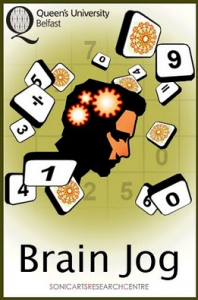 Researcher at Queen’s college worked closely with adults over 50 to develop four puzzles in a brain training app designed to improve brain health.
Researcher at Queen’s college worked closely with adults over 50 to develop four puzzles in a brain training app designed to improve brain health.
“Brain Jog is unique among similar apps in that it has come to fruition after extensive research and collaboration with the target audience to find out exactly what appeals to them. “By downloading this app, you can help us create a fantastic game experience for those over 50 and bring us one step closer to finding out whether or not brain training can help prevent cognitive decline and dementia.”
You can play Brain Jog on the iPhone, iPad or iPod. The four puzzles test and build cognition in spatial reasoning, working memory, arithmetic and verbal ability.
This is a good opportunity to get some free brain training and help shape the next version of the product.
Categories: Cognitive Decline, Software Tags: games, smart phone
Brain Training Lowers Car Crashes by 50%
 Systematic brain training using software to improve your cognitive performance is a relatively new technique. The software acts like a brain gym working your memory, visual cognition, speed of processing, numeracy, decision-making skills and the like to make them bigger and stronger. More than 10 vendors will sell you a package and program ranging in price from $20 to hundreds. We have covered most of them here on the Next Brain Blog.
Systematic brain training using software to improve your cognitive performance is a relatively new technique. The software acts like a brain gym working your memory, visual cognition, speed of processing, numeracy, decision-making skills and the like to make them bigger and stronger. More than 10 vendors will sell you a package and program ranging in price from $20 to hundreds. We have covered most of them here on the Next Brain Blog.
But does it work? And does it work better than solving crossword puzzles, playing video games or other mentally stimulating things we do for fun? There is compelling evidence that brain training software has impact it is just not clear how much.
So I am always on the lookout for new studies that look at the effectiveness of brain training software. For example, Posit Science recently publish a synopsis of two studies done in 2010. Note Posit Science sells brain training software but the studies were conducted by academic researchers in neuroscience and psychology. These are interesting because both studies show improvement in cognitive performance on tasks outside the training software. One even demonstrated a 50% reduction in at-fault car crashes over a six year period:
“This study looked at crash records for 908 older drivers who trained on a version of Posit Science’s Road Tour exercise six years earlier. Road Tour expands “useful field of view,” how much a person can take in with a single glance. Useful field of view is critical to safe driving: a wider field can help drivers spot dangers in their peripheral vision in time to react. The study authors found that training with the Road Tour technology (called “speed-of-processing training” in the study) cut a driver’s crash risk. In fact, they were responsible for about 50% fewer crashes than their untrained peers. Road Tour is available as part of both the InSight and DriveSharp brain fitness programs.”
This is an important result. It shows that brain training software can improve the cognitive performance of older adults enough to impact an important daily activity.
Interested to hear from readers that use brain training software. How does it improve your cognitive performance in daily life?
Categories: Decision Making, Older Adult, Perception, Software, Training Tags: brain training
Brainwave Control Toys Move Forward
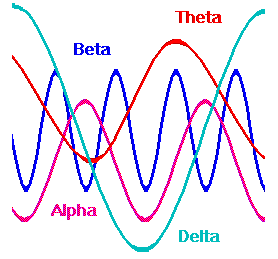 Learning to control your brainwaves through concentration, relaxation, visualization, meditation and other techniques is a cornerstone for peak cognitive performance. Learning to control your brainwave is often difficult because you don’t have direct and immediate feedback on what state you are in. Neurofeedback devices that display information about brain states in real-time solve that problem. The devices work on a brain-to-computer interface and have recently move into the consumer market.
Learning to control your brainwaves through concentration, relaxation, visualization, meditation and other techniques is a cornerstone for peak cognitive performance. Learning to control your brainwave is often difficult because you don’t have direct and immediate feedback on what state you are in. Neurofeedback devices that display information about brain states in real-time solve that problem. The devices work on a brain-to-computer interface and have recently move into the consumer market.
You can get simple models for home use and they have been built into games.
Neurofeedback offers one of the best hopes for a breakthrough in brain training and peak cognitive performance.
So I am always on the look out for new consumer-level neurofeedback devices that might be of interest to readers of the Next Brain Brain blog. Mattel has announced a new version of their Mindflex mental acuity game, call Mindflex Duel: The cost is $99. Here is the short story:
“Using advanced technology, Mindflex Duel headsets sense brain activity and send messages to the game platform. Strap on a headset, connect the sensor clip to your earlobe, and align the strap’s metal sensor so it’s flush against your forehead. Your brain activity will trigger the game platform’s motors, which will propel the ball. Bulk up your brain, sharpen your focus, and battle your friends with this hands-free challenge!”
Being able to do neurofeedback in a competitive mode could be a big step forward in using the technology for brain training.
Very interested to hear from readers that use home-based neurofeedback to improve brain function and achieve peak cognitive performance.
Categories: Executive Function, Mental Focus, Software Tags: games, neurofeeback
Action Video Games Work Mental Muscles Big Time
 Multiple experiments done by Daphne Bavelier, professor of brain and cognitive sciences and her group at the University of Rochester, strongly suggest that action video games improve perception (speed and accuracy), attention (including multi-tasking), decision-making and other aspects of cognition.
Multiple experiments done by Daphne Bavelier, professor of brain and cognitive sciences and her group at the University of Rochester, strongly suggest that action video games improve perception (speed and accuracy), attention (including multi-tasking), decision-making and other aspects of cognition.
That is an amazing workout for the brain especially if you are getting it by having fun. The key is to play a game that is first-person and includes a lots of action or visual-motor coordination. My favorites are Geometry Wars and Soul Caliber 4.
Interested to hear from readers that play action video games. Which games do your play? Can you feel them working your mental muscles?
Categories: Decision Making, Memory and Learning, Mental Focus, Perception, Software Tags: brain training, games
Jump Two Reading Grade Levels in 8 Weeks
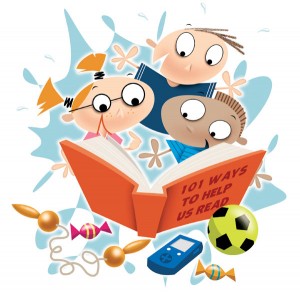 I receive emails from parents asking about brain training for their children. Improving kid’s brain function and cognitive performance, especially in school is a very active area. It is covered regularly on the Next Brain Blog. You can check out what has already been posted by going to the categories pull down menu (to the right) and selecting Child or Student under the Life Stage or Vocation category.
I receive emails from parents asking about brain training for their children. Improving kid’s brain function and cognitive performance, especially in school is a very active area. It is covered regularly on the Next Brain Blog. You can check out what has already been posted by going to the categories pull down menu (to the right) and selecting Child or Student under the Life Stage or Vocation category.
One of the most exciting and scientifically robust options parents have for boosting the brain power of their children are the products provided by Scientific Learning (I have no affiliation). They apply brain fitness techniques to improve reading and language comprehension skills in K-12. They have good evidence to claim that they can:
Improve the reading level of students by two grades even if the student is already performing at an advanced level.
Parents can rent the program here for about $200.
Interested to hear from readers that have experience with brain fitness products from Scientific Learning.
Categories: Child, Memory and Learning, Software Tags: speed reading
Advanced Neurofeedback Training Near You?
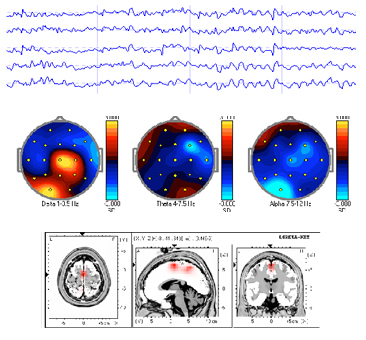 In neurofeedback training you learn to regulate your brainwaves. As the neurons in your brain fire they produce an electrical signature across your scalp call an Electroencephalograph or EEG. The EEG is detected using sensors on your head and is feed into a device that turns it into a signal such as a beep, movement of the cursor on a computer screen, a change in a video game or even the motion of a remote control toy. The idea is that the signal acts as feedback for learning to get your brain into a certain state such as relaxation, creative flow, higher processing speed, greater focus and so on.
In neurofeedback training you learn to regulate your brainwaves. As the neurons in your brain fire they produce an electrical signature across your scalp call an Electroencephalograph or EEG. The EEG is detected using sensors on your head and is feed into a device that turns it into a signal such as a beep, movement of the cursor on a computer screen, a change in a video game or even the motion of a remote control toy. The idea is that the signal acts as feedback for learning to get your brain into a certain state such as relaxation, creative flow, higher processing speed, greater focus and so on.
Neurofeedback is a powerful tool for improving your brain function and cognitive performance and will be covered frequently on the Next Brain Blog. Getting access to clinical grade neurofeedback training can be hard and costly. That may be changing with Neurotopia’s recent announcement of a remote version of their NeuroStation:
“The NeuroStation™ REMOTE is the first technology designed specifically for widespread adoption of neurofeedback. Neurotopia represents a paradigm shift by bringing neurofeedback into the consumer market through healthcare providers, academic centers, and sports performance facilities.”
Neurotopia is well-known for using the most advanced protocols and equipment to achieve real results with neurofeedback. They have specific protocols for achieving peak performance. It includes zone, reaction time, balance, recovery and sleep techniques and is applicable to sports, business and all walks of life.
Interested to hear from readers that have experience with Neurotopia’s approach or other clinician delivered neurofeedback training for peak cognitive performance.
Categories: Mental Focus, Software, Training Tags: neurofeeback
Training for a High-Performing Emotional Brain
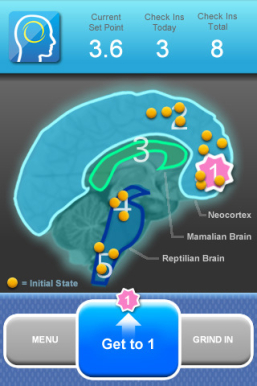 Emotions play a key and often dominate role in our brain function and cognitive performance. We create emotions anytime we appraise or make judgments on people, events, ideas or other things. Our ability to spot, understand and manage emotions in ourselves and others correlates more strongly to life success than IQ. So-called emotional intelligence is a cornerstone for high performance learning, decision-making, creativity, collaboration and other mental and social processes. So I am also on the lookout for new science-based techniques for training my emotional brain.
Emotions play a key and often dominate role in our brain function and cognitive performance. We create emotions anytime we appraise or make judgments on people, events, ideas or other things. Our ability to spot, understand and manage emotions in ourselves and others correlates more strongly to life success than IQ. So-called emotional intelligence is a cornerstone for high performance learning, decision-making, creativity, collaboration and other mental and social processes. So I am also on the lookout for new science-based techniques for training my emotional brain.
For example, take the work on Emotional Brain Training or EBT. It provides a simple way to assess which of five core brain states you are in and then suggests a tool for achieving self-regulation . The five brain states and associated tools are related to your level of stress and include:
- Balanced/reward (joy) state use the Sanctuary tool
- Balanced state use the Feelings check tool
- Verge of stress (mixed) state use the Emotional Housecleaning tool
- Stressed (unbalanced) state use the Cycle tool
- Full blown stress (underwhelmed) state use the Damage control tool
To get started right away you can download the Emotional Brain Training iPhone app (shown above) or find the equivalent in the Droid market.
 If you want to understand more of the theory behind how it works check out the new book, Wired for Joy. Or consider some of the training and coaching offerings from the Institute for Health Solutions.
If you want to understand more of the theory behind how it works check out the new book, Wired for Joy. Or consider some of the training and coaching offerings from the Institute for Health Solutions.
I am just learning to use EBT and am interested to hear from readers that have some experience with one or more of the five tools.
Categories: IQ and EQ, Lifestyle, Manage Emotions, Software, Training Tags: emotion, EQ, smart phone
How Visually Change Blind Are You?
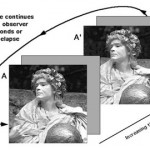 Found an interesting cognitive neuroscience demonstration on Go Cognitive designed to let you test yourself in the change-blindness paradigm. Change blindness involves making significant changes in a visual scene that go unnoticed.
Found an interesting cognitive neuroscience demonstration on Go Cognitive designed to let you test yourself in the change-blindness paradigm. Change blindness involves making significant changes in a visual scene that go unnoticed.
The demo is fun, gives you a number of scenes to work with and lets you control some key parameters. Experiment a bit, especially with the strategy you use to detect changes. Try defocussing your eyes and looking at the images globally to detect a difference and then try systematically comparing the images item by item. Which gives you a better score?
Categories: Perception, Software Tags:


